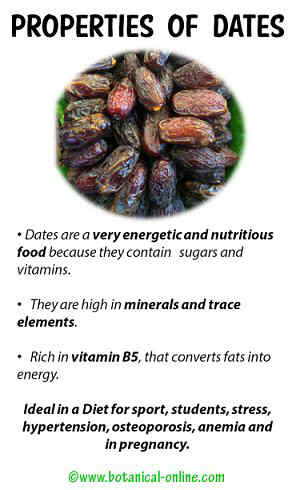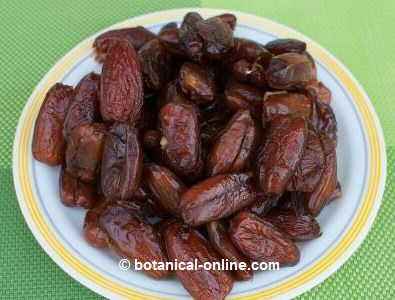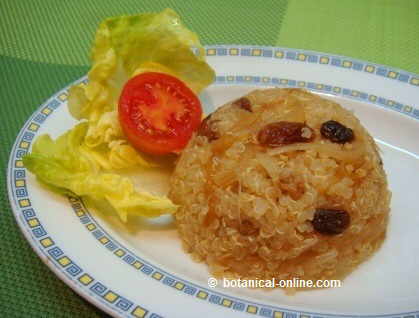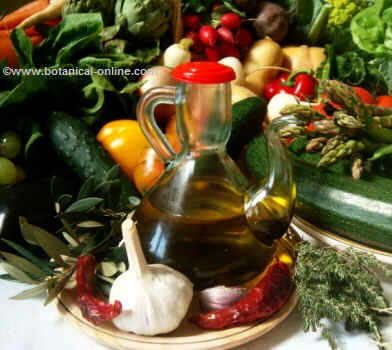Contents [show]
What do dates provide?
Dates, a high-energy food for your muscles and brain
 Main curative properties of dates
Main curative properties of dates
Because of their high content in carbohydrates and sugars, dates can be considered as one of the main high-energy food.
Ideal to replenish energy after a long walk or when working hard.
A good source of energy for children who can keep playing for a long time without feeling the sensation of fatigue, or for athletes after or during competition.
Dates to avoid snacking between meals
Unlike other energetic food, which provides empty energy of very short duration, dates can keep us satiated for a long time.
Because their sugars, easily assimilated, are released gradually prolonging the feeling of satiety.
In this sense, these fruits are ideal for keeping us happy when we are hungry between meals without the need for sweets, or other less desirable junk food.
Dates are very good to avoid craving for food
Dates for the brain to work better
Dates add a lot of energy, both to the muscles and brain, thus allowing not only great physical effort, but also increasing mental agility, so, they are a good resource for students who can concentrate better and do much better on tests if they eat a few dates at breakfast or lunch, for example.
Dates for sport
In addition to its valuable content in important nutrients for sports, such as carbohydrates (important especially in endurance sports), potassium, phosphorus, calcium, magnesium and antioxidants, dates are very rich in pantothenic acid (vitamin B5), a vitamin necessary for the hormonal production as well as for the transformation of fats and carbohydrates into energy.
It is thought that the ingestion of foods rich in pantothenic acid contributes to perform much more in sports. Studies were conducted according to which the ingestion of a couple of grams of vitamin B5 daily achieved higher marks.

Photo of dates
Antioxidant properties of dates
Dates are one of the plant foods richest in glutamine, an amino acid.
The organism, with the union of the amino acids cysteine and glutamic acid (derived from glutamine), can obtain a potent antioxidant, glutathione, which helps reduce the damage caused by free radicals and increases the life of antioxidant vitamins (vitamin E and vitamin C)
Dates are good to soothe you and help you sleep better
This food is very rich in vitamin B5 or pantothenic acid, a vitamin necessary for hormone production and for the transformation of fats and carbohydrates into energy. It is thought that eating foods rich in this vitamin contributes to yield much more in sport. According to some studies, the ingestion of a few grams of vitamin B5 managed to get higher marks.
The same vitamin is used for stress, nervousness or anxiety. Dates, in this sense can be regarded as “anti-stress natural pills” because of the ability to relax the individual and make him/her feel better. One should eat dates before going to sleep, because it contains tryptophan, which stimulates the production of melatonin, is a good solution to sleep well and prevent insomnia.
It also contains lots of vitamin B3 or niacin, which, in addition to intervene in the metabolism of fats, sugars and proteins, helps lower cholesterol, participates in the health of nerves and skin, lowers blood pressure and helps to keep the digestive system in good condition.
 A bunch of dates
A bunch of dates
Minerals of dates
Dates are very rich in minerals. They contain much potassium, especially dried dates. Potassium maintains fluid balance in the body by means of counteracting sodium.
Dates increase urination and help to treat fluid retention and other diseases related to accumulation of toxins and fluid in the joints such as gout or arthritis. By increasing diuresis, it has a positive effect against hypertension.
In addition to potassium, dates contain copper, a mineral involved in the formation of hemoglobin in the blood. Its deficiency can cause anemia, nervous system problems or high cholesterol.
They are also rich in magnesium and calcium. The first is essential for the transmission of nerve impulses and heart rate. Calcium is necessary for the proper formation of bones and teeth.
Dates contain plenty of fiber
Having so much fiber, they can be useful to prevent or treat constipation. At the same time, soluble fiber is a very useful to avoid cholesterol to increase since this type of fiber drags it and prevents it from being absorbed in the intestine.
However, due to its caloric value, people with obesity and cholesterol problems should consume this food in moderation, since in excess it could increase the production of triglycerides.
Dates are high in in iodine, being very useful for hypotiroidism. They contain contain phytoestrogens, so they should be included in the menopause diet.
How to eat dates?
Dates can be eaten alone as a dessert, in between meals as a snack, or added to other dishes such as desserts or muesli.
How to preserve dates?
To preserve them, we must store them in a dry airtight glass jar in a dark place. Preserved in this way, they can be preserved for a long time without spoiling.
When dates should not be eaten? Who should not eat dates?
- People with obesity or in slimming diets: Despite all these properties, one should keep in mind that dates have many calories, so we must be cautious in their intake. It is a food that should be taken sparingly, especially in dieting or obesity problems.
- People with diabetes: Its sugar content is very high, so they are not suitable for people with diabetes.
- People prone to teeth decay: Because of the sticky nature of the date sugars, they are usually retained in the the teeth for long, so they can lead to tooth decay. One way to avoid this is to eat a little fragment of apple (a good remedy for scrubbing your teeth and gums) or brushing your teeth after eating them.
- People with sensitive stomachs, very prone to intestinal decomposition, dates, eaten in abundance, can cause flatulence, diarrhea or heartburn. They should eat this fruit with moderation.
- People with migraines: The tyramine content of this fruit can cause migraines in some people sensitive to this element.
- People with hyperthyroidism: Dates are are hyperthyroidal food, producing an increase in thyroid output, so, they are not suitable for hyperthyroidism patients.
Are dates good for pregnancy?
Pregnant women should not abuse the consumption of certain fruits such as pineapples, plums or dates because they are rich in serotonin, an abortive active principle.
Main components of dates
Composition of dry dates per 100 g. | |
| Water | 22,5 g |
| Calories | 275 kcal |
| Fat | 0,45 g |
| Protein | 1,9 g |
| Carbohydrates | 73, 51 g |
| Fiber | 7,5 g |
| Potassium | 652 mg |
| Phosphorus | 40 mg |
| Iron | 1, 15 mg |
| Sodium | 0 mg |
| Magnesium | 7 mg |
| Calcium | 32 mg |
| Copper | 0, 28 mg |
| Zinc | 0, 29 mg |
| Selenium | 1, 9 mcg |
| Vitamin C | 0 |
| Vitamin A | 50 UI |
| Vitamin B1 (Thiamin) | 0,090 mg |
| Vitamin B2 (Riboflavin) | 0, 100 mg |
| Vitamin E | 0, 100 mg |
| Niacin | 2, 2 mg |
![]() More information on dates.
More information on dates.








